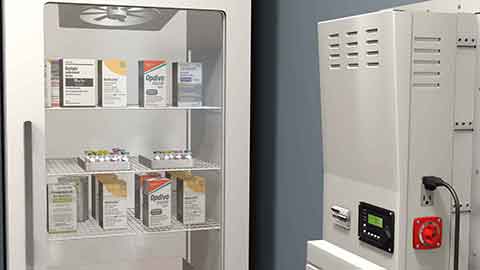The Hidden Challenges of Installing a Backup Power System in a Medical Office or Pharmacy
The healthcare industry needs access to continuous power to function normally. Power outages in medical facilities and pharmacy settings cause operational disruption, threaten patient safety and can be very costly. A backup power system installation remains a desirable preventive measure, although the implementation process requires careful consideration and planning.
Budget limitations, maintenance costs, and other considerations are essential for creating a powerful and reliable backup power system. Pre-installment assessment of these challenges will protect financial resources and facility operations against issues in the future. This blog delves into how companies need to evaluate their financial resources alongside potential return on investment (ROI) to craft budget plans for their backup power systems.
1. Budget Considerations: Balancing Costs and ROI
Budget determination stands as the main hurdle when it comes to choosing a back up power system. Business owners must weigh upfront costs vs. long-term savings to make an informed decision. Making the right choice by understanding the relationship between initial expenses and future operating costs is important. Factors influencing the budget include:
- Type and capacity of the backup power system
- Installation expenses
- Additional equipment and infrastructure upgrades
Some organizations must allocate funds for extra expenses, including modifying electrical systems, installing new wiring structures, and preparing sites. Reducing these costs might be possible via financing programs and tax incentives that target energy resilience investments.
2. Space Constraints: Finding Room for Power Backup
Medical facilities, pharmacies included, work from restricted facility sizes. Installing backup power equipment requires sufficient space to access equipment alongside proper ventilation and maintenance points. Key considerations include:
- Placement of generators, battery backups, or inverters
- Compliance with fire safety regulations
- Ensuring noise control and ventilation
Small medical buildings face challenges when finding space to install big generators or battery storage components. The proper fit between system capacity and physical dimensions must be achieved. Some modern backup systems offer space-saving designs, such as wall-mounted battery backups or compact inverter-based solutions that take up minimal floor space.
Mountable power systems alongside small battery backup systems provide a way to solve power capacity problems while maintaining operational efficiency. Professionals in power backup can assist businesses in discovering solutions that fulfill their power supply needs together with adequate space utilization.
3. Savings and Return on Investment (ROI)
The high initial expenditures required for backup power system setup become worthwhile because they lead to ongoing financial savings. Reliable backup systems protect against the following three things:
- Revenue loss due to operational downtime
- Spoilage of temperature-sensitive medications and vaccines
- Healthcare programs using electronic health records result in data loss.
The return on backup power investment depends on energy efficiency, fuel costs, and maintenance expenses. Solar-integrated battery systems serve as modern backup technology that approaches cost-saving efficiency by minimizing traditional generator usage.
By ensuring continuous operations, businesses can achieve a higher return on investment (ROI) over time. Implementing automatic transfer switches and load management systems as energy-efficient investments enhances operational cost savings.
4. Regulatory Approvals and Compliance
Operations in healthcare facilities and pharmacies need to fulfill all power backup requirements at the local, state, and federal levels. The approval procedure for new systems requires extensive work that demands significant time commitments. Some key requirements include:
- Compliance with state pharmacy board regulations
- Environmental considerations, such as noise and emissions regulations
- Backup power systems must follow the National Electrical Code requirements to guarantee safe electrical functions during installation.
-
Installations handling controlled substances at healthcare facilities are bound to follow specific security protocols whenever they use backup power systems.
Failure to fulfill legal requirements regarding these standards might result in performance delays and fines, potentially preventing legal operations. Professional backup power installation services and regulatory experts will help simplify the approval process and prevent avoidable mistakes.
5. Operational Disruptions During Installation
Systems that provide backup electricity require more than mere equipment acquisition since the actual installation period disturbs ongoing business activities. Challenges include:
- Temporary power shutdowns
- Noise and construction-related disturbances
- Reconfiguration of electrical infrastructure
- Staff members must be trained in operating the recently installed backup system.
When planning an installation, choosing times that align with off-hours or downtimes is the best way to reduce operational interruptions. Private companies must develop strategies for dealing with short-lived operational interruptions while their systems are tested with their existing electrical networks. Partnering with healthcare environment specialists can make a smooth hospital operation transition during installation achievable.
6. Ongoing Maintenance and Testing
The reliability of a backup power system depends heavily on how well maintainers follow their service routines. Most organizations fail to recognize the critical importance of constant testing and maintenance procedures. Regular maintenance tasks include:
- System testing under actual operating situations must be performed through load testing methods to confirm correct functionality.
- Fuel checks and battery replacements
- Software update programs run automatically on modern battery backup systems.
- Business organizations must verify that their backup power systems provide enough capacity to accommodate future business expansion needs.
Emergency power backup systems lose effectiveness when maintenance routines are not followed. Healthcare facilities' scheduled maintenance must include system tests each quarter and professional inspections at least once a year. Medical facilities can improve reliability by building monitoring systems that recognize problems before they generate failures.
Conclusion
Strategic planning becomes essential for medical offices and pharmacies to overcome the concealed challenges despite their undeniable backup power system benefits. Budget constraints, space limitations, regulatory approvals, installation disruptions, and ongoing maintenance play crucial roles. Businesses that address these factors will obtain a reliable power backup solution with optimal cost-effectiveness that meets all regulatory needs.
A backup power system that receives proper installation and regular maintenance protects facilities through unexpected outages and enhances operational efficiency to let healthcare providers perform uninterrupted care.


